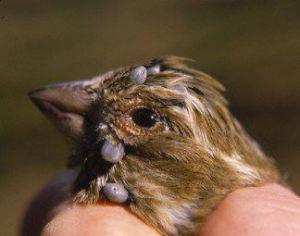Yesterday I wrote a piece for Community Chickens on the *possibility* of chickens having Lyme disease.
I wrote the article for two reasons:
I recently participated in a chicken diseases class where one of the diseases identified – Spirochetosis (which Latin for “general infection with Spirochetes” - definitely caught my attention. The bacteria identified was the Borrelia anserine transmitted by the fowl tick and the symptoms were, guess what? Some that are very similar to Lyme.
- Depression
- Cyanosis
- Diarrhea
- Leg weakness that progresses to paralysis and death
So chickens can get spirochetes and as a former microbiologist, I know that a spirochete by any other name still stinks.
I’ve looked and looked and there doesn’t seem to be any studies on Lyme disease in Backyard flocks (maybe I should go back to school just to do this study.) I did find one study that showed young chicks can transmit Lyme but not older ones. Perhaps chickens develop a natural immunity by eating ticks, or maybe it’s just because no one’s looked that it’s not found.
But, if chickens have blood and chickens are around ticks, and this can happen to a bird:

well I’m just saying that Lyme disease in a chicken is not outside the realm of possibility.
The other reason I wrote the article is because one of my daughters who has been previously treated for Lyme had a recent relapse (perhaps re-infection) and is suffering from symptoms again. (4 of my 6 kids have Lyme disease – that’s what you get for hiking in New Hampshire.) Her joints hurt, she’s sleeping all the time and she has these strange rashes on her body. Our doctor has put her back on the Lyme protocol and she should be feeling better in a few weeks but she’ll have to be on the meds for months. (I’m one of those people who brings my kids to a Lyme literate doc.)
So yeah, Lyme is weighing heavy on my mind these days.
Does this mean I’m going to get rid of our chickens?
Not at all.
But it does mean that in our neck of the woods where we are surrounded by ticks and where if you get bit by a tick you have a 70% (SEVENTY PERCENT!!) chance of being exposed to Lyme disease, I’m going to take the same precautions that I would for my dog.
- No blood/skin contact – gloves used for treatment of wounds
- Poop gets cleaned up.
- And all foods from chickens (we only eat eggs but this would include meat) will be properly cooked.
- Hands thoroughly washed after each contact with the chickens
Oh and full body tick checks, constant, constant, tick checks. I’m just not going to take any chances.
***
Wendy Thomas writes about the lessons learned while raising children and chickens in New Hampshire. Contact her at [email protected]
Also, join me on Facebook to find out more about the flock (children and chickens) and see some pretty funny chicken jokes, photos of tiny houses, and even a recipe or two.

